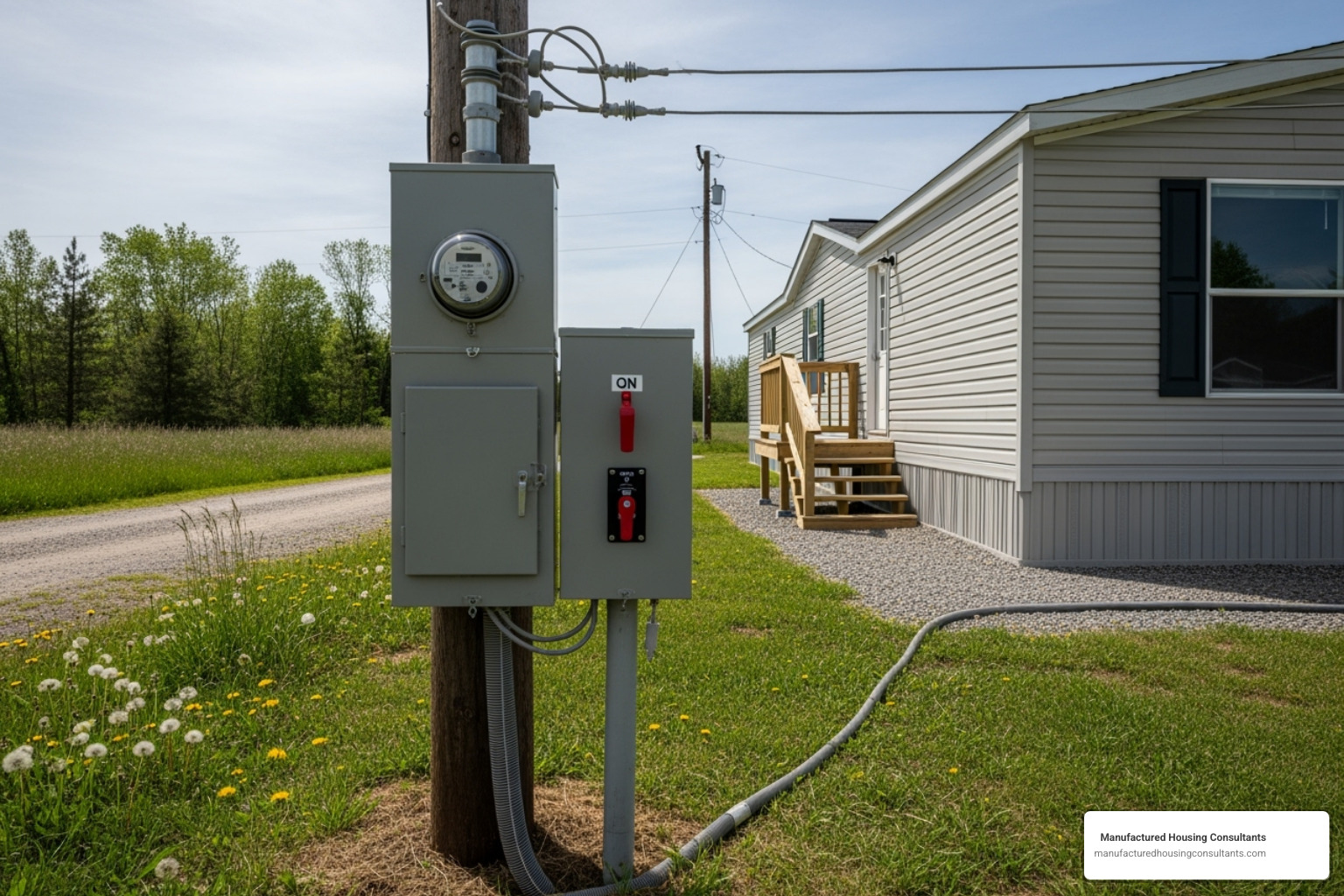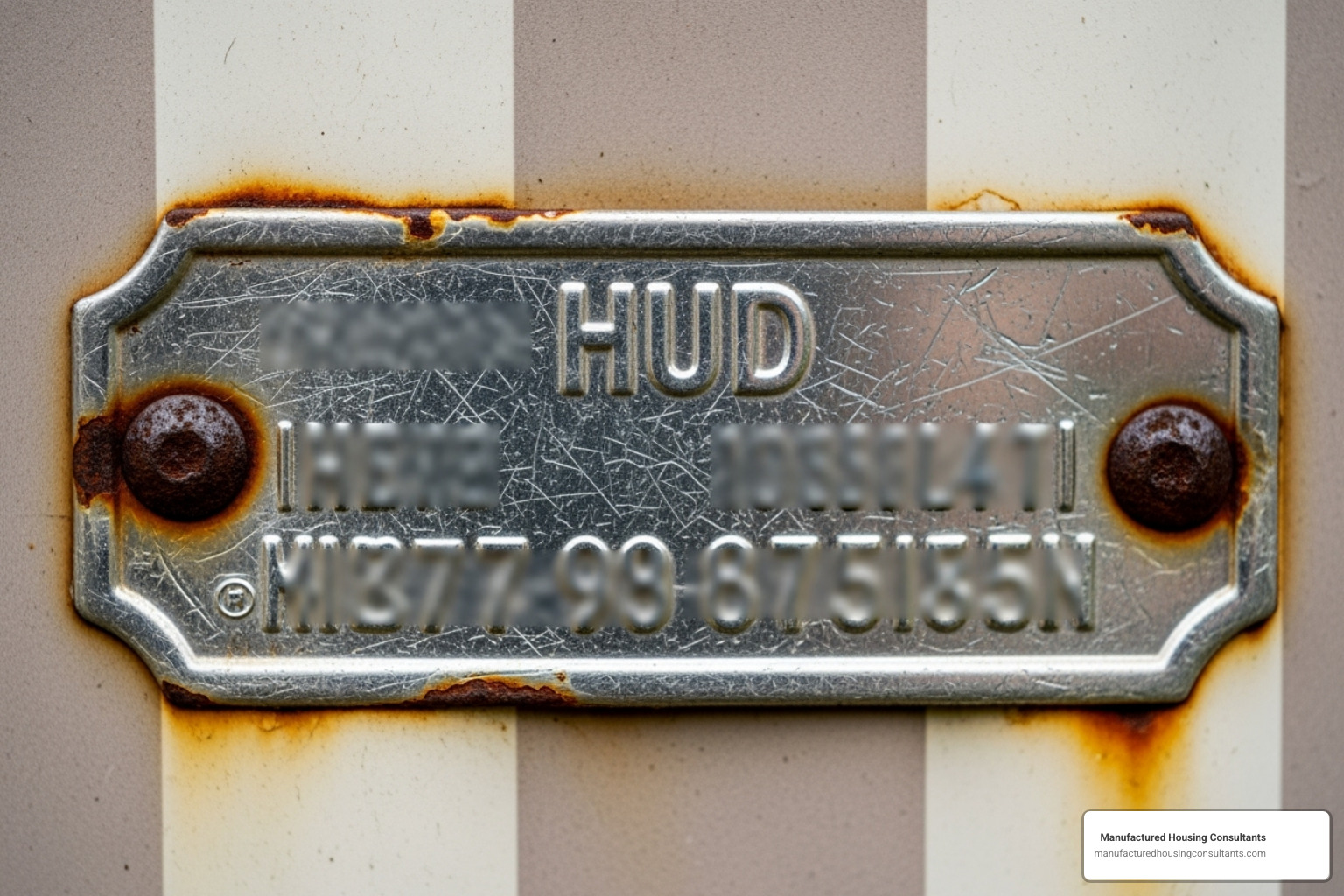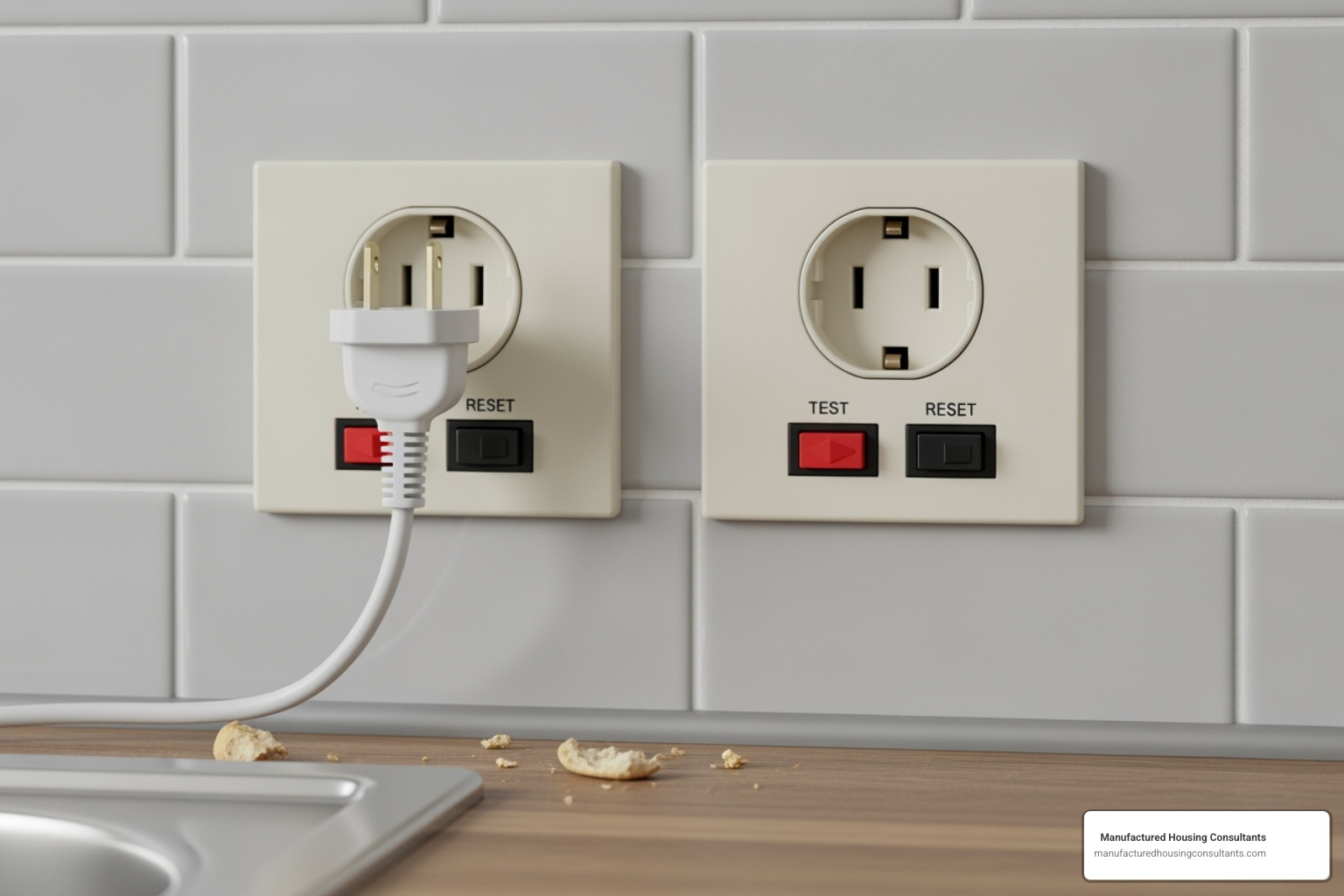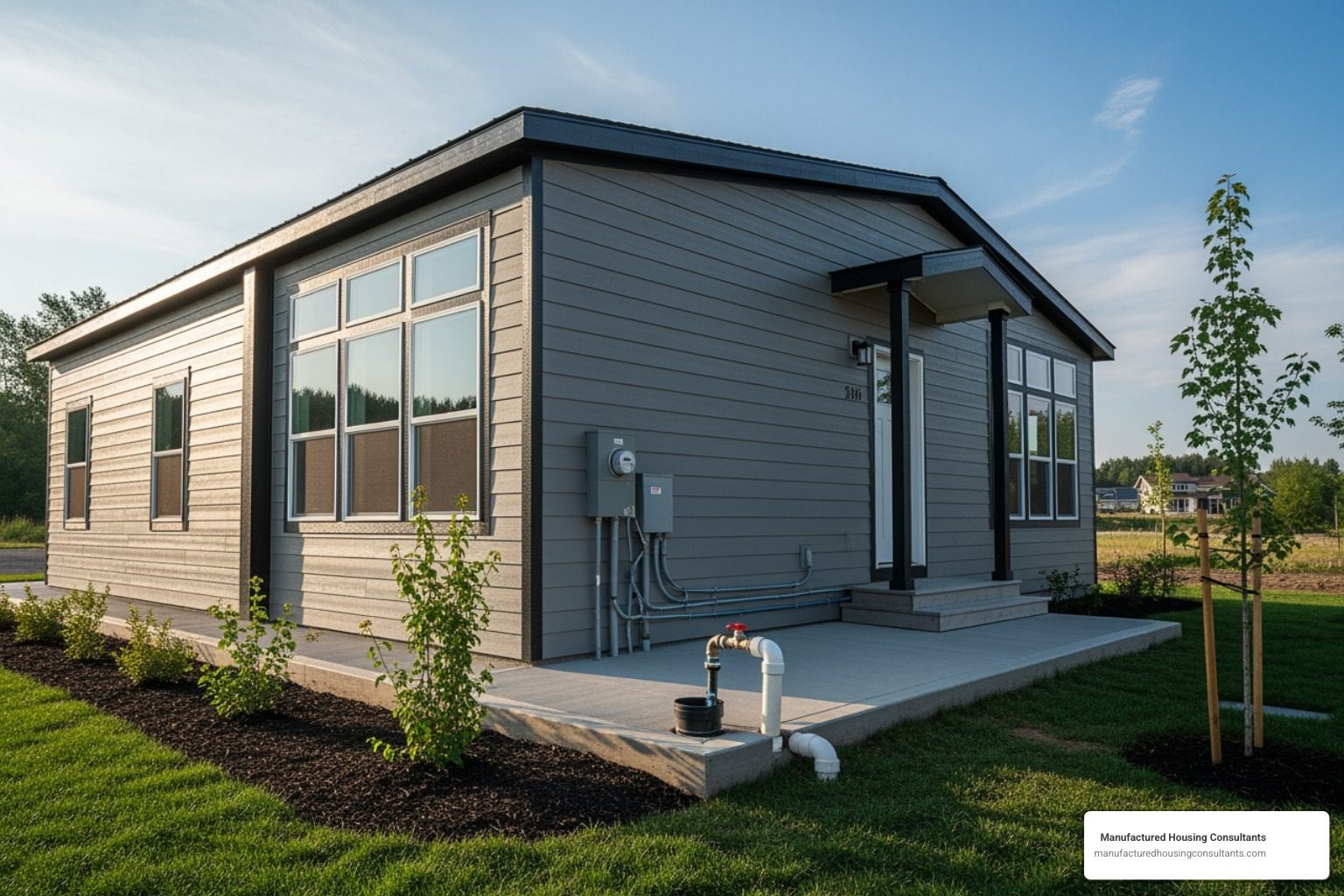Why Mobile Home Electric Service Requires Special Attention
Mobile home electric service differs significantly from traditional house wiring. Getting it wrong can cause move-in delays, void your insurance, or create serious safety hazards. In Texas, your system must meet both HUD standards and National Electric Code (NEC) Article 550 requirements before you can legally connect to power.
Quick answer for those searching for mobile home electric service information:
- Main service panel must be located outside the home, typically within 30 feet and within sight of the dwelling
- Minimum 100-amp service required (200-amp recommended for homes with electric heat or modern appliances)
- Four-wire service is mandatory: two hot wires, one neutral, and one ground
- Separate grounding system needed because the metal chassis doesn’t ground like a traditional foundation
- Licensed electrician strongly recommended due to unique code requirements and safety concerns
Manufactured homes are classified by the U.S. Department of Housing and Urban Development (HUD) as factory-built structures. Due to their metal frames, they require a detached service panel—usually on a pole or pedestal—for safety, unlike site-built homes where the panel attaches directly to the house.
This setup requires a separate grounding rod installed outside the home. Inside your home’s distribution panel, the neutral bar must be isolated from the metal enclosure, while the grounding bar bonds directly to it. Reversing this creates a severe shock hazard. While some electricians avoid these “small” jobs, the specialized knowledge of HUD codes and Texas permit requirements is critical for a safe and compliant installation.

Whether you’re moving a home onto rural land in the Hill Country, setting up in a San Antonio mobile home park, or installing service for the first time, understanding your electrical options will save you money and keep your family safe. As consultants serving the greater San Antonio and Houston areas, we help you navigate these requirements by connecting you with qualified electricians. It’s important to clarify that we do not perform the electrical work ourselves, nor are we the utility provider that supplies the power. Our role is to ensure you have the right professional for the job. Here’s what you need to know.
Understanding Your Mobile Home Electric Service: A Step-by-Step Guide
Setting up mobile home electric service in Texas correctly is one of your most important steps. Once you understand the key components and rules, the process makes sense. Let’s walk through what makes it different and how to choose the right system for your new home in San Antonio, Houston, or the surrounding areas.
Key Differences: Mobile Home vs. Site-Built Electrical Systems
The electrical setup for a manufactured home has key differences from a site-built house, all based on safety requirements. The main difference is the service panel location. NEC Article 550.32 requires the main panel with the meter and disconnect to be on a separate service pole or pedestal, not attached to the home. It must be within sight and generally no more than 30 feet away. This rule ensures emergency responders can quickly disconnect power without entering the home.

Grounding is also different. Because of the home’s steel chassis, the NEC requires four-wire service: two hot wires, one neutral, and one dedicated grounding wire. The ground wire connects to an external grounding rod, creating a safe path for stray current. Inside the home’s panel (which acts as a subpanel), the neutral bar must be isolated from the metal enclosure, while the grounding bar bonds to it. This is opposite to the main panel and critical to prevent shock hazards.
Manufactured homes (built to federal HUD standards under NEC Article 550) differ from modular homes, which follow local building codes like site-built houses. Our guide on Modular vs. Manufactured Home explains this further.
Core Components and Installation Choices
Understanding the components of your mobile home electric service helps you make informed decisions.
The service pedestal or pole is where power from the utility enters your property. It holds the main service panel, including the main disconnect breaker that controls all power to your home. From there, four feeder wires carry power to your home’s internal distribution panel. For a broader understanding of how residential electrical systems work, All about electrical systems offers excellent background information.
Proper grounding and bonding are critical. A grounding rod must be driven into the earth and connected to your electrical system. Bonding the chassis connects all metal parts, creating a continuous path to safely direct electricity during a fault. Skipping these steps creates severe shock and fire hazards.
You’ll also choose between underground and overhead service. Overhead is typically cheaper but exposed to weather. Underground service looks cleaner and is more protected, but excavation adds cost. The choice often depends on aesthetics and practicality for your Texas property.
Either way, working with experienced professionals makes the process smoother. At Manufactured Housing Consultants, we coordinate with qualified electricians who understand the unique requirements of manufactured homes in Texas. To be clear, our service is coordination and project management; we do not sell electrical components like service pedestals or feeder wires, nor do we perform the trenching for underground service. We connect you with the experts who handle these specific tasks. Check out Our Services to see how we can help with your complete setup.
Choosing the Right Amperage: 100A vs. 200A Service
A common question is whether to choose 100-amp or 200-amp service. This decision impacts your home’s daily function and future capabilities. While the NEC minimum for mobile home electric service is 100 amps, “minimum” is rarely ideal for modern living.
A 100-amp service might suffice for a small single-wide with gas heat and few appliances. However, most modern homes, especially double-wides or any home with electric heat, require 200-amp service. Your load calculation—the total demand from all appliances, lighting, and HVAC—is key. In Texas, air conditioning is a major draw, and when combined with other modern devices, your needs grow quickly.
Here’s how the two options compare:
- 100-Amp Service: Best for smaller single-wides with gas heat and minimal appliances. It’s cheaper initially but offers no room for future upgrades and can lead to tripped breakers.
- 200-Amp Service: Necessary for double-wides, homes with electric heat, or modern appliance loads. It provides ample power for simultaneous use and future additions like an EV charger. Most new homes come standard with 200-amp panels.
Installing 200-amp service from the start is a smart way to future-proof your home. Upgrading later is more expensive and disruptive. It’s a wise investment for today’s needs and tomorrow’s technology. If you’re deciding between home sizes, our article Which Mobile Home is Perfect for Me: Single Wide or Double Wide? walks through how home size affects your utility needs.
The bottom line: For most Texas homeowners setting up a new manufactured home in our service areas of San Antonio, Houston, and beyond, 200-amp service is the smart choice.
Ensuring a Safe and Compliant Connection in Texas
Correctly installing your mobile home electric service is about safety, insurance validity, and code compliance. In Texas, understanding the rules is essential to keep your family safe and your home legal.
Navigating NEC Article 550 and Local Texas Codes
When setting up service in Texas, you must follow the National Electrical Code (NEC), specifically NEC Article 550, which is the rulebook for manufactured homes. It covers everything from panel location to grounding.
Your home’s permanent HUD label (or data plate) proves it was built to federal safety standards, including electrical. Inspectors require this label, and it’s crucial for permits and insurance.

A key rule is the 30-foot rule from NEC Article 550.32, which requires the main service panel to be on an external pole or pedestal, within sight of the home and no more than 30 feet away. The within-sight requirement is literal—the disconnect must be visible from the home. This allows emergency responders to quickly disconnect power.
While the NEC sets the baseline, local Texas jurisdictions like San Antonio and Von Ormy have their own permitting and inspection processes. Always check with your local building department for specific requirements before work begins. Obtaining permits isn’t just about avoiding fines; it ensures a qualified inspector verifies the work is safe. Skipping this step can void your insurance, complicate a future sale, and put your family at risk. Local inspections are a critical safety check.
The DIY vs. Pro Decision for Your Mobile Home Electric Service
While DIY projects can be tempting, mobile home electric service is a job for a professional. The unique requirements and safety risks are too high to leave to chance. The risks of unlicensed work are significant, including failed inspections, voided insurance, and the tragic potential for electrical fires.
A licensed electrician specializing in manufactured homes understands the specific requirements of NEC Article 550, proper grounding for a metal chassis, and local Texas codes. A professional handles the entire process: assessing your site, installing the service pedestal, running feeder wires, installing the critical grounding system, and ensuring the internal panel is correctly configured. They also obtain all necessary permits and coordinate with the utility provider.
The benefits of hiring a specialist include work warranties, valid insurance, and peace of mind. Professional hookup costs in Texas can range from a few hundred to several thousand dollars, but the cost of DIY gone wrong—rework, fines, or a fire—far outweighs the price of professional installation.
At Manufactured Housing Consultants, we don’t just sell you a home and wish you luck. Our Mobile Home Relocation Services include coordination with trusted electricians who know manufactured homes inside and out, serving San Antonio, Houston, and communities throughout Texas. It’s crucial to understand our role: Manufactured Housing Consultants acts as your project coordinator to ensure a smooth process. We are not a licensed electrical contractor and do not perform the physical installation. Furthermore, we do not offer standalone electrical repair services for existing homes; our focus is on coordinating the complete utility setup for homes we help our clients purchase or relocate.
Final Safety Checks and Long-Term Maintenance
After professional installation, ongoing maintenance is key to keeping your mobile home electric service safe. Regular checks can prevent major issues.
Start with the basics. Ensure you have working smoke detectors in every bedroom and on each level, and carbon monoxide alarms if you have gas appliances. Test them monthly. GFCI outlets are crucial for preventing shocks in areas with water, like kitchens and bathrooms. If your older home lacks them, upgrading is a priority. While Manufactured Housing Consultants does not offer these specific upgrade or repair services, the professional electricians we partner with for new home setups can often provide quotes for such work.

Be aware of hazards in older mobile homes. Outdated wiring, insufficient amperage for modern appliances, and improper grounding can create fire and shock risks. Your home will often show signs of electrical problems. Call an electrician if you notice:
- Frequent circuit breaker trips
- Flickering or dimming lights
- Strange odors (burning or “fishy” smells)
- Warm or discolored outlets
- Buzzing or crackling sounds
- Minor shocks from appliances
Even without warning signs, a regular inspection by a qualified electrician every 3-5 years is smart preventive maintenance. It ensures your system remains safe and up to code.
At Manufactured Housing Consultants, we believe that safely connecting your manufactured home to reliable power is just as important as finding you the right home in the first place. That’s why our Utility Connections services help clients throughout Texas—from San Antonio to Houston and everywhere in between—steer the complexities of electrical service with confidence.
Your mobile home should be a safe, comfortable haven for your family. With proper installation and ongoing vigilance, your electrical system will provide reliable power for years to come. Don’t take shortcuts with electricity—the stakes are simply too high.




